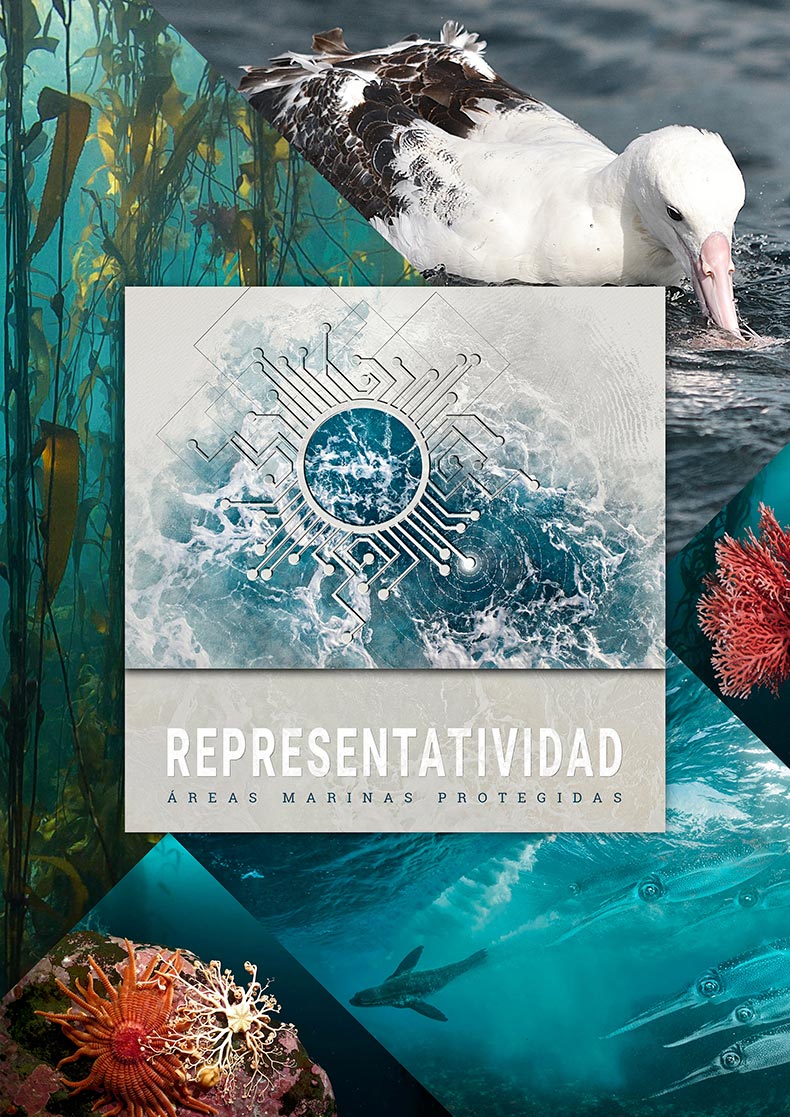The Forum for the Conservation of the Patagonian Sea launched a series of webinars. This cycle aimed to encourage the dialogue on what the challenges are in order to achieve Marine Protected Areas (MPAs) that effectively represent the sea’s varied ecosystems and that are able to stand their ground in the face of climate change. The webinars focused on Chile and Argentina as case studies to showcase the vastness of the Patagonian Sea.
The first webinar of the cycle, titled “Challenges for the conservation of the Patagonian Sea: an Argentinian and Chilean outlook on the opportunities for planning and implementing Marine Protected Areas’ systems”, was conducted on August 25, with a virtual attendance of over 160 representatives of institutions devoted to the conservation and sustainable use of the marine biodiversity, both governmental, educational and belonging to the civil society. The talk focused on analizing how the already existing MPAs in Argentina and Chile represent the variety of marine habitats and their biodiversity, and on identifying challenges and opportunities for improvement.

The webinar featured brief presentations on the topic by several members of organizations that belong to the Forum:
- Representation goals of marine ecosystems in Chilean public policies and legal framework. By Carolina Jarpa (Chile).
- Chilean marine ecosystems and their representation in MPAs. By Rodrigo Hucke-Gaete, Centro Ballena Azul (Chile) and Programa Austral Patagonia (UACH).
- Representation of marine ecosystems in Argentina’s legal framework – main references in the current legislation. By Ana Di Pangracio, Fundación Ambiente y Recursos Naturales (Argentina); and Pablo Filippo, Forum.
- Argentinian marine ecosystems and their representation in MPAs. By Valeria Falabella, Wildlife Conservation Society (Argentina).
Next, we moderated a talk with professionals from the public sector, scientists and experts. The goal was to reflect on the challenges and opportunities, encouraging a regional approach. The panel was comprised by:
- Diego Flores Arrate, Head of the Department for Protected Areas, Department of Environment, Chile.
- Mercedes Santos, National Director of Marine Protected Areas, National Parks Administration of Argentina.
- Aldo Farías, Coordinator of the Southern Patagonia Programme (Programa Austral Patagonia), Universidad Austral de Chile
- Gustavo Lovrich, Main Investigator, CADIC-CONICET (Argentina).
Challenges for the protection of the Patagonian Sea’s entire biodiversity
Chile and Argentina have made significant progress towards the achievement of goals that promote the protection of, at least, 10% of the sea surface by 2020. To date, Chile has over 40% of its sea surface protected, and Argentina over 8%. These are significant achievements, but still insufficient. One of the reasons for this -in which the first webinar focused on- is that there are still challenges that must be faced in order to broaden the protection of the ecosystems and ecoregions still not represented in MPA systems.
Among the present opportunities for progress into the fulfilling of this requirement, it was highlighted that both countries have human resources who continue to get trained for the proper creation and management of MPAs, as well as having a favourable -yet improvable- legal framework for marine conservation.
Favourable opportunities were also identified on an international level. Facing 2030, the level of consensus on the need to broaden marine conservation through MPA networks keeps on growing. This scenario might be favourable when it comes to obtaining resources to progress in marine conservation.
In spite of identifying that the protection of the diversity of the seas is still not fully representative within the MPAs, we recognised other conservation measures -such as fishing management and national action plans for the protection of species, among others- that must be combined and taken into account to contribute to a proper conservation.
We also recognised that fostering and creating dialogue, cooperation and collaboration instances between science, government and civil society actors -with experience in marine management- is also a necessary requirement to face this challenge. Fortunately, the collaboration between countries has a positive regional background, as is the School for MPAs’ Managers of the Southern Cone.
The biggest units in need for conservation are on the borders of the countries’ seas, outside the areas where it is becoming necessary to transform conflicts of use into opportunities for conservation. MPAs -taken as complementary tools for other marine ecosystem management measures- could provide both a solution for usage and biodiversity conservation needs.

This proposal has the support of the Chilean Department of Environment, the Undersecretariat for Fisheries and Aquaculture of Chile and the National Parks Administration of Argentina. It also has the support of Oceans5 and the David and Lucile Packard Foundation.